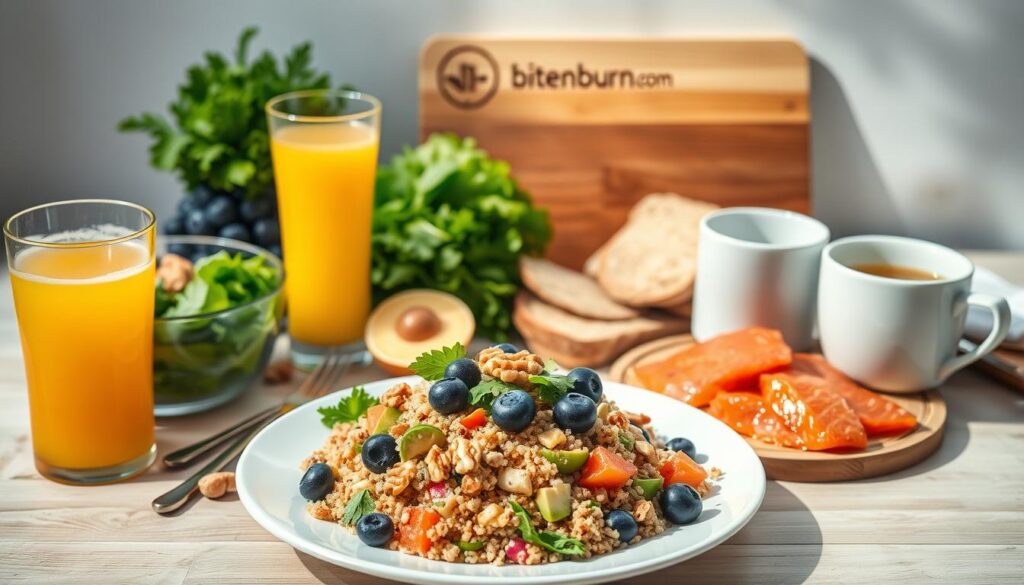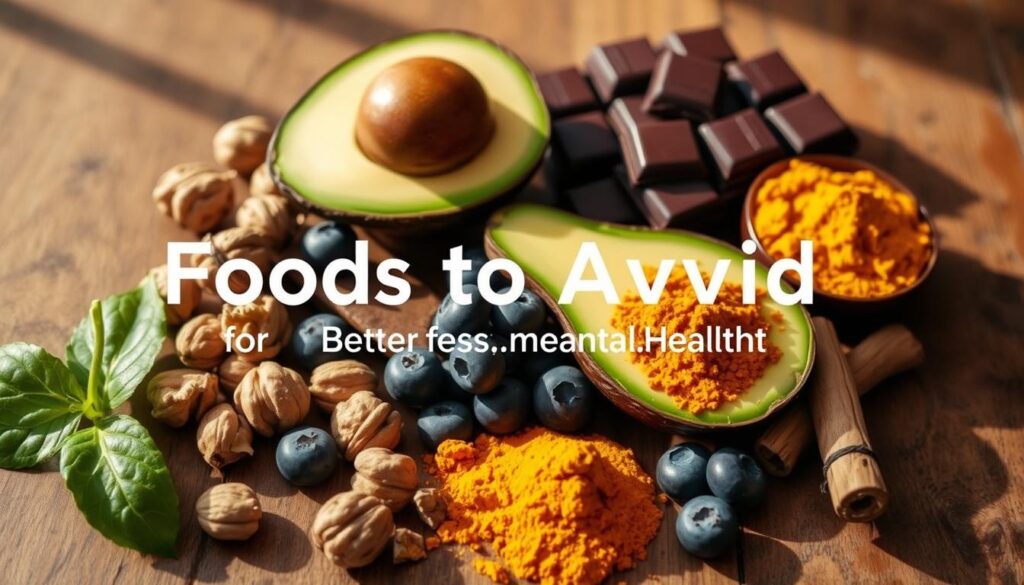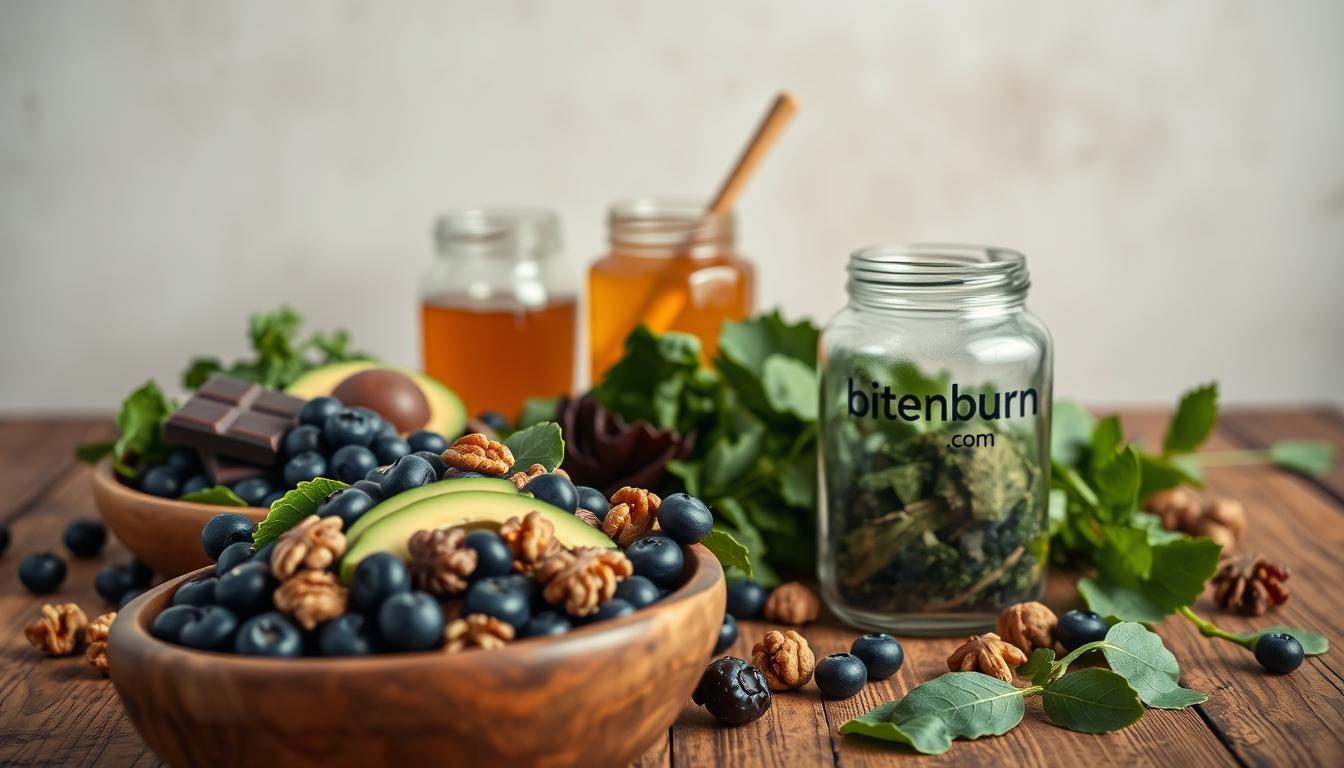Did you know that certain foods can significantly impact your brain’s performance and overall mental wellbeing? The connection between diet and brain function is more profound than many realize, with specific nutrients playing a crucial role in maintaining optimal brain health.
As the control center of our body, our brain is responsible for everything from basic functions like heartbeat and breathing to complex tasks like problem-solving and emotional regulation. Eating the right foods can help keep our brain in peak condition, supporting cognitive function, mood regulation, and overall mental health.
We’ll explore how specific comfort foods can positively impact mental wellbeing while satisfying cravings, and identify five key options that support brain health.
Key Takeaways
- Certain comfort foods can boost cognitive function and mood regulation.
- The relationship between diet and brain function is significant.
- Specific nutrients play a crucial role in maintaining optimal brain health.
- Eating the right foods can help keep the brain in peak condition.
- Five specific comfort foods can support brain health while satisfying cravings.
The Connection Between Food and Mental Health
The intricate relationship between our dietary choices and mental well-being is becoming increasingly evident. As we explore this connection, it becomes clear that the food we eat plays a crucial role in our overall brain function and mental health.
How Your Diet Affects Brain Function
The brain is a highly energy-demanding organ, requiring approximately 20% of the body’s energy resources despite accounting for only 2% of its weight. This high energy demand underscores the importance of nutrition for optimal brain function. Nutrients from our diet are directly utilized by the brain for various cognitive tasks, ranging from basic operations to complex problem-solving.
The Science Behind Food and Mood
Recent studies have elucidated how certain dietary patterns can influence neurotransmitter production, inflammation levels in the brain, and overall neural health. For instance, a diet rich in processed foods and refined sugars can have detrimental effects on mental health, whereas a diet emphasizing whole foods can support better cognitive function and emotional regulation. The gut-brain connection also plays a pivotal role, with the microbiome in our digestive system communicating directly with our brain and influencing our mood and mental health.
Nutrient-rich foods can support better cognitive function and emotional regulation, while a diet lacking essential nutrients can contribute to mental health challenges. This highlights the importance of making informed dietary choices to support our mental well-being.
| Dietary Component | Effect on Brain Function | Impact on Mental Health |
|---|---|---|
| Processed Foods | Negative impact due to high levels of refined fats and sugars | Increased risk of depression and anxiety |
| Whole Foods | Positive impact due to rich nutrient profile | Supports better cognitive function and emotional regulation |
| Omega-3 Fatty Acids | Supports brain health and function | May help reduce symptoms of depression |
As we continue to explore the connection between food and mental health, it becomes evident that our dietary choices have a profound impact on our brain function and overall well-being. By making informed choices and emphasizing nutrient-rich foods, we can take a proactive approach to supporting our mental health.
Understanding Brain-Boosting Nutrients

Our brains rely heavily on the nutrients we consume to function optimally. A diet lacking in essential nutrients can negatively impact cognitive function and mental wellbeing.
Essential Nutrients for Cognitive Health
Certain nutrients play a crucial role in maintaining healthy brain function. These include omega-3 fatty acids, antioxidants, B vitamins, vitamin D, magnesium, and zinc. Omega-3 fatty acids, particularly, support cell membrane fluidity, while antioxidants protect against oxidative damage.
How These Nutrients Support Mental Wellbeing
These nutrients work together to support neurotransmitter production, reduce inflammation, and maintain healthy neural connections. For instance, B vitamins are crucial for synthesizing neurotransmitters, while magnesium helps regulate neuronal function. Ensuring adequate intake of these nutrients is essential for maintaining optimal mental wellbeing.
Why Comfort Foods Matter for Mental Health
There’s a deep-seated relationship between the foods we consider comforting and our mental health. Comfort foods can significantly impact our mood and stress levels.
According to WebMD, certain foods can improve stress levels by boosting the brain’s calming chemicals, such as serotonin. Foods like pasta, oatmeal, and oranges can have a positive effect on our mental wellbeing.
The Psychological Benefits of Comfort Foods
Comfort foods can trigger positive emotional responses, often linked to pleasant memories. The psychological aspect of comfort foods is significant, as they can stimulate the release of serotonin and dopamine, neurotransmitters associated with pleasure and mood regulation.
“Comfort foods can be a valuable tool in managing stress and improving mood.”
Balancing Comfort and Nutrition
The challenge lies in finding comfort foods that satisfy emotional needs while providing nutritional benefits. Traditional comfort foods often contain ingredients that may temporarily boost mood but can lead to inflammation and reduced cognitive function.
We can opt for “healthy comfort foods” that satisfy cravings while delivering nutrients for long-term brain health. This balance is crucial for maintaining both emotional wellbeing and cognitive function.
5 Healthy Comfort Foods That Boost Your Mind

We’ve identified five key comfort foods that research shows can enhance cognitive function and support overall brain health. These foods are not only delicious but also packed with nutrients that provide benefits for our mental wellbeing.
What Makes These Foods Special
Each of these comfort foods has been chosen for its ability to satisfy our cravings while delivering specific nutrients known to support brain health. They work through multiple mechanisms, from providing essential fatty acids to delivering antioxidants that protect against oxidative damage.
How to Incorporate Them Into Your Diet
Incorporating these foods into your daily diet is easier than you think. They can be added to everyday meals without requiring complex preparation or exotic ingredients, contributing to both immediate mood enhancement and long-term brain health benefits.
Fatty Fish: The Ultimate Brain Food
The importance of fatty fish in a brain-healthy diet cannot be overstated, thanks to its rich omega-3 fatty acid content. Fatty fish like salmon, mackerel, and sardines are considered premier brain foods due to their high concentration of these essential fats.
The Power of Omega-3 Fatty Acids
Omega-3 fatty acids, particularly DHA and EPA, play a crucial role in brain function and development. They are incorporated into brain cell membranes, improving neural communication and supporting cognitive functions like memory and learning. Omega-3s also have anti-inflammatory properties that help protect brain cells from damage.
Comforting Fish Recipes for Mental Clarity
Transforming fatty fish into comforting meals can be simple and delicious. Try a salmon fillet baked with lemon and herbs, or a hearty sardine pâté on whole-grain toast. These recipes not only nourish your brain but also provide a satisfying comfort food experience.
How Often to Eat Fish for Brain Benefits
To maintain optimal brain health, it’s recommended to consume fatty fish 2-3 times weekly. When choosing fish, consider sustainable options and be mindful of mercury levels to maximize the benefits while minimizing risks.
Dark Chocolate: The Mood-Lifting Treat
Dark chocolate is more than just a sweet treat; it’s a powerful tool for boosting our mood and brain health. With a cocoa content of 70% or higher, dark chocolate contains brain-boosting compounds like flavonoids, caffeine, and antioxidants that may help improve cognitive function.
Flavonoids and Their Effect on Brain Health
Flavonoids in dark chocolate have been shown to increase blood flow to the brain, potentially improving cognitive function and helping protect brain cells from damage. These compounds may also enhance memory and slow age-related mental decline.
Choosing the Right Chocolate for Maximum Benefits
To reap the benefits, it’s crucial to choose high-quality dark chocolate with minimal added sugar. Look for products with at least 70% cocoa content to ensure you’re getting a rich dose of flavonoids and other beneficial compounds.
Delicious Ways to Enjoy Dark Chocolate
Enjoy dark chocolate in moderation by pairing it with other brain-healthy foods like nuts or berries. You can also use it as a topping for oatmeal or yogurt, adding a boost of antioxidants and flavonoids to your meal.
Berries: Nature’s Antioxidant Powerhouse
Berries, particularly those with deep colors, are rich in antioxidants that play a crucial role in protecting our brain cells. These fruits are not just delicious but also packed with nutrients that support cognitive health.
Protecting Brain Cells
Antioxidants in berries help protect brain cells from oxidative stress and inflammation, factors that can contribute to brain aging and neurodegenerative diseases. By consuming berries, we can support our brain health and potentially improve memory and cognitive function.
Best Berries for Cognitive Function
Blueberries, strawberries, and blackberries are among the top berries for brain health due to their high antioxidant content. Blueberries are particularly noted for their ability to help improve memory and delay cognitive aging.
Simple Berry Recipes
Incorporating berries into your diet is easy and delicious. Try adding them to your oatmeal or yogurt, or blend them into a smoothie. You can also enjoy them as a snack on their own or mixed with nuts and seeds for added brain benefits.
Whole Grain Oats: The Comforting Brain Fuel
When it comes to brain health, whole grain oats are a nutritional powerhouse that deserves attention. They offer a great source of slow-release energy which helps to stabilise mood and blood sugar levels throughout the day.
Steady Energy for Optimal Brain Function
Whole grain oats provide brain supporting nutrition through their complex carbohydrates, fiber, and micronutrients. The low glycemic impact of oats delivers steady, sustained energy to the brain, helping to maintain consistent cognitive function throughout the day.
Cozy Oatmeal Recipes to Boost Your Mind
Transform whole grain oats into delicious breakfast dishes that support brain health. Try our blueberry and nut oat bake, a great make-ahead breakfast that packs a serious nutrition punch. Enhance your oatmeal with other brain-boosting foods like berries, dark chocolate, and nuts to create a comforting and nutritious meal.
Nuts and Seeds: Crunchy Mood Enhancers
Nuts and seeds are not just satisfying snacks; they’re also powerful mood enhancers that support brain health. Various nuts and seeds, such as walnuts, almonds, flaxseeds, and pumpkin seeds, are rich in essential nutrients that benefit cognitive function.
Essential Fats and Proteins for Brain Health
Nuts and seeds are an excellent source of healthy fats and proteins that support brain health. For instance, walnuts are rich in omega-3 ALA, while almonds are high in vitamin E. Pumpkin seeds are packed with magnesium and zinc, nutrients that are crucial for cognitive function and mood regulation.
Creative Ways to Include Nuts in Your Comfort Foods
You can easily incorporate nuts and seeds into your diet by adding them to oatmeal, yogurt, or salads. They can also be used in baking or as a crunchy topping for vegetables. This not only enhances the flavor but also boosts the nutritional value of your meals.
Creating a Brain-Healthy Meal Plan

Creating a brain-healthy meal plan is essential for supporting cognitive function and overall mental wellbeing. A well-structured meal plan incorporates the five brain-boosting comfort foods in balanced combinations.
Sample Weekly Menu
A sample 7-day meal plan can include breakfast, lunch, dinner, and snack ideas that prioritize brain health. For example, oatmeal with berries and nuts for breakfast, or fatty fish with whole grains for dinner.
Tips for Balance
To balance comfort and nutrition, focus on variety and moderation. Include multiple brain-boosting nutrients in each meal and adapt the plan to your dietary needs.
Foods to Avoid for Better Mental Health

While a healthy diet is crucial for overall wellbeing, certain foods can negatively impact our brain health and mood. Research suggests that a diet rich in whole foods, fruits, vegetables, and whole grains can support mental health, whereas highly processed foods and those with added sugars may have adverse effects.
According to WebMD and Harvard Medical School, a balanced diet plays a significant role in managing depression and anxiety. Foods that are high in sugar, salt, and unhealthy fats not only affect our physical health but can also have a profound impact on our mental wellbeing.
“A healthy diet is part of an overall treatment plan for managing depression and anxiety,” as suggested by various health institutions.
Let’s examine some of the foods that may negatively impact our mental health:
- Highly processed foods that lack essential nutrients
- Foods and beverages with added sugars
- Trans fats found in processed snacks
- Alcohol and caffeine, which can disrupt sleep and exacerbate anxiety symptoms
These foods can affect our mental health through various mechanisms, including promoting inflammation, disrupting gut health, and causing fluctuations in blood sugar levels. For instance, excessive sugar consumption has been linked to an increased risk of depression.
| Foods to Limit | Potential Impact on Mental Health |
|---|---|
| Highly Processed Foods | Promotes inflammation and disrupts gut health |
| Foods with Added Sugars | Causes blood sugar fluctuations and affects brain chemistry |
| Trans Fats | Negatively impacts overall health and wellbeing |
To maintain better mental health, it’s not necessary to completely eliminate these foods but to be mindful of our consumption. We can start by making healthier substitutions that still satisfy our cravings. For example, choosing whole grain options over processed snacks or opting for dark chocolate, which contains flavonoids beneficial for brain health.
By being aware of the foods that can impact our mental health and making informed choices, we can take a significant step towards supporting our brain health and overall wellbeing.
Conclusion: Nourishing Your Mind Through Food
Nourishing our brain through the right foods is a powerful step towards achieving better mental health and a healthier mood. By incorporating the five healthy comfort foods we’ve discussed into our diet, we can significantly enhance our cognitive function and overall wellbeing. Making gradual, sustainable changes to our eating habits can have cumulative benefits over time, supporting a healthier brain and potentially alleviating symptoms of depression and anxiety. Experiment with these foods and pay attention to how they affect your mood and energy levels day to day.


[…] create a comfortable practice environment, start by choosing the right yoga mat that provides adequate grip and cushioning. Ensure you have […]
[…] do so many people struggle to keep their health resolutions beyond a few months? According to a Forbes Health Poll, the average resolution lasts […]